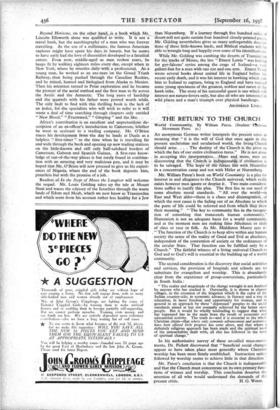HE RETURN TO THE CHURCH
World Community. By William Paton. (Student -Christian
Movement Press. 5s.) . .
AN anonymous German writer interprets the present crisis as meaning that "-it is the will of God that xxice again in this present unchristian and secularised world, the living Church should arise. . . . The destiny of the Church is the pivot on which the fate of our entire civilisatiOn rums." He is not alone ,in ,-accepting this ..jntermetation.: :-More as* more, men are *: discovering- that the Church is indisitensab*if civilisation is tO be salvaged. -The hoie'nf theqiitttre heti with Niemoller in a concentration camp and not with Hitler at Nuremberg , Mr. William Paton's book -on World Comtnitility is a plea for interest in and allegiance to the Church universal, which really exists however men ignore-or despise it. Two main- considera- tions suffice to justify this plea. The first lies in our need of some absolute moral standards. "All over the world—in East and West alike—there is a chaos and disintegration, of which the root cause is the fading out of an Absolute to which the parts of life could be referred and froin-WhiCdiew -their meaning." - "-The key to community lies in the-recogni- tion of something that transcends human community." Humanism is not an adequate basis for a world community, and at the moment Men are making false AtisciluteS or idols of class or race or folk. As Mr. Middleton 'Murry sees it: , "The function of the Church is to keep alive within any human society the sense of the reality of Good and Evil as absolutes, independent of the conyention of society or the cirdinances of the secular State. That function can be fulfilled only by a Church." The faithful -witness of a living universal Church to God and to God's Will is essential to the-building- up of a world community.
The second consideration is the discovery that social activities and services, the provision of hospitals and schools are no Substitute for evangelism and worship. This is- abundantly clear from the experience of group-conversions, particularly in South India :
"The reality and magnitude of the change wrought is not doubted by anyone who has studied it. Outwardly, it is shown in cleaner in the cessation of the litigation Which - is the curse of the Indian country-side, in economic advance, in literacy and a rise in education, in more freedom and opportunity for women, and in general in an approach by these 'depressed ' peoples to the social - standards aimed at but not normally achieved by the better caste _ people. But it would be wholly misleading- to- suggest that what hat happened has in the main been the: result of econonlic and educational activity. The truth is—and it is essential to the whole Christian claim—that where only economic advancement and assistance have been offered little progress has come about, and that where a definitely religious approach has beets made and the spiritual teed of the untouchables dealt with, all else has followed in the train of spiritual change."
In his authoritative survey of these so-called mass-move- ments, Dr. Pickett discovered that "beneficial social changes appear to have taken place most generally where Christian worship has been most firmly established. Instruction unless followed -by worship seems to achieve little in that direction."
Mr. Paton's conclusion is that the Church is indispensable and That the Church must concentrate on its "own primary func- tions of witness and worship. This conclusion deserves the attention of all who would Understand the demands .of the present crisis. H. G. WOOD.










































 Previous page
Previous page